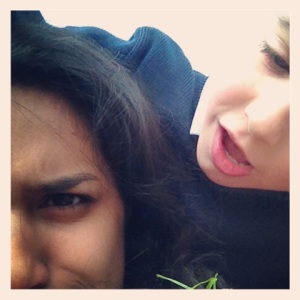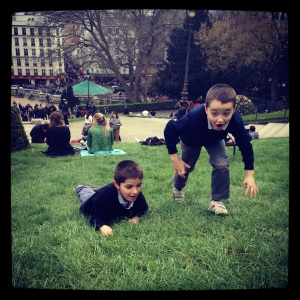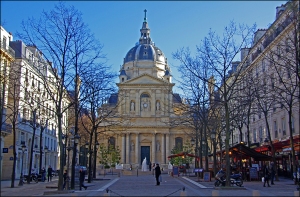As usual, this week has been filled with strange and lovely happenings, from the Paris By Night bike ride with my host sister’s girl scout troop, to a picnic dinner outside the Louvre last night. This is the second full week of above 60 degree weather in Paris, and the city seems to be shedding its skin, exchanging parkas and beanies for dresses and shorts. Every green space in the city is littered with the sun-seekers: natives and tourists alike, brazenly and joyfully ignoring every “Keep Off The Grass” sign.
Perhaps the strangest occurrence this week was what happened Wednesday night.
My friend Lily (of the Lily Theory fame) and I were cramming for our Thursday morning art history exam in her host mother’s 6th floor apartment that overlooks Notre-Dame. The coffee table was covered with class notes and the remains of our afternoon gouter (a full baguette, goat cheese and Nutella). As the sun began to set around 7, I packed my bag, wished Lily happy studying, and skipped down the stairs to the Metro, hoping to make it home by 7:30 for family dinner.
The station was filled with people, the entrance blocked by about 10 French policemen. It wasn’t uncommon for the policeman to patrol the metro stations, making sure that people had actually bought tickets. I ignored them and pushed my way through the turnstiles to the platform.
The boy next to me was sporting a bright red and navy Paris-St.-Germain scarf, in honor of the city’s soccer team. A policeman next to me turned to the boy.
“You should probably put that away,” he muttered darkly. “I’m a a fan, too, it’s not that. I just wouldn’t wear it right now.”
The boy glanced at his father, who nodded, before bundling his scarf and tucking inside his jacket. The metro arrived, and we all piled in. As was normal, there were no seats left, so I leaned up against the train wall, next to a young French woman in bright red lipstick and a seemingly effortless up-do. The metro lurched to a start, and we were on our way.

getting my hair decorated with grass. thanks, charles.
At the third or fourth stop, the train stopped, the doors opened, and a loud burst of noise broke my stupor. I craned my neck to see. Both platforms were flooded with dozens and dozens of men, at least a hundred, yelling and screaming at each other. They started throwing things across the train tracks, and within minutes, there was a full-blown mass fist fight on the platforms. Never having seen a single punch thrown in real life, I was torn between shock, fear, and pure excitement.
I turned to the girl next to me. “What’s going on?”
“It’s stupid. There’s a PSG game tonight,” she responded. “Those are the other team’s fans. They’re probably German. Damn Nazis.”
Ignoring the last comment, I pressed on. “Where did the police go? Why aren’t they doing something?”
She laughed. “They didn’t board with us. They just were just there to see us get on the train safely, and then they waved goodbye.”
“What? Why were they there in the first place?”
“This is the metro line for the soccer stadium,” interjected a man in a tweed suit. “Sometimes it gets a little rowdy before the game. But never like this…” The fighting was escalating. Some of the men now trying to board our car. An old lady screamed, pushing her way away from the doors, towards us.
“Well why aren’t we moving?” I demanded.
“They had to switch the trains off,” the man explained. “They probably don’t want one of those idiots falling onto the tracks and getting hit by a train.”
Minutes later, another shout went up. The French police force shoved their way through the masses, subduing the fighting, pinning the particular rowdy fans to the ground.
“Everyone off the metro! Let’s go, let’s go! Move it!” They herded us off our car. The blob of people moved forward, all together, up the stairs towards the exit.
Finally outside, I exhaled. The night air was fresh and breezy. I scanned the crowd, pushing my way out of the center of it. Ambulances and police cars surrounded the square. I turned to the girl, who was now holding the hand of the old lady who had screamed.
“Are you okay?” I asked the lady.
“She’s gonna be fine. We’re just gonna find a place to sit and calm down,” the girl responded soothingly.
“D’you need any help?”
“We’ll be fine. Thanks, though.” They disappeared into the crowd.
I turned away from the metro station, taking in my surroundings. I knew where I was, at least an hour walk away from my apartment, but it was a beautiful night, and I really didn’t have a choice. As I walked, I shook my head in disbelief and laughed, marveling over what was sure to make an excellent story.
Favorite new phrase: Du coup – literally means “of the shot”. Actually means nothing and everything. Can be used to mean “so”, “therefore”, “what’s more”, “also”, “and”, “as a result”, and pretty much any other conjunction/connecting word. Used liberally, this will make you sound quintessentially Parisian. Throw out “alors” and “donc” and try “du coup” on for size instead.
Example: Il y a un match de foot ce soir, et du coup, il y avait une grande émeute dans le métro – There’s a soccer game tonight, so there was a huge riot in the metro. (Duh. Doesn’t that happen before every sporting event?)























